Columns
-
The Blue Velvet Project, #86
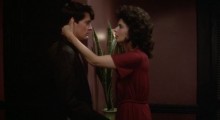
Second #4042, 67:22 In a 1964 interview Orson Welles talked about the relationship between the visual and the spoken word in film. He said that I couldn’t arrive at [the visual] without the solidity of the word taken as a basic for constructing the images. What happens is that when the visual components are shot the words are obscured. The most classical example is Lady from Shanghai. The scene in the aquarium was so gripping visually that no one heard what was being said. And what was said was, for all that, the marrow of the film. Could Lady from […]
-
The Blue Velvet Project, #85
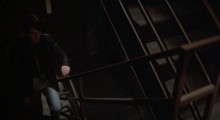
Second #3995, 66:35 1. Jeffrey, just after the kiss with Sandy, is on his way up the dark, industrially-vibed staircase to Dorothy’s apartment. He has had his chaste kiss; new he wants more. He is hungry for Dorothy, who dispenses with shy-girl playfulness and gives Jeffrey the Real Thing. 2. The blackness of the frame. The amount of screen space dedicated to the experience of no visible light. There is light, of course–just enough–but Jeffrey travels in these moments mostly through the dark. 3. In He Died with His Eyes Open, the first of Derek Raymond’s British crime noir Factory […]
-
This Is Not A Film — A Hammer to Nail Review
(This Is Not A Film begins a two-week engagement at Film Forum today, courtesy of Palisades Tartan. The movie will then open in other U.S. locations, starting with Los Angeles in early March. Go to the film’s website for details.) For those unfamiliar with the backstory: Jafar Panahi, one of Iran’s most acclaimed directors (The White Balloon, The Circle, Crimson Gold, Offside), was arrested in 2009. A known supporter of the opposition movement, Panahi was charged with “activity against national security and propaganda activities against the regime.” Despite domestic and international outpourings of support, he was sentenced in 2010 to […]
-
The Blue Velvet Project, #84
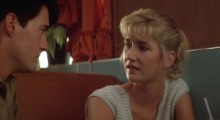
Second #3948, 65:48 “Can a photograph be lonely?” is a question asked in Don DeLillo’s novel Libra. Another version of the question might go, “Can a photograph make a person lonely?” How about a movie frame? How deep can loneliness get, at 24 frames per second? What follows, below, is a visual descent into loneliness, just under two seconds in movie time. It happens so quickly in movies, moments like this. We remember them not frame-by-frame, but decompressed, stretching out and out, a kiss that lasts forever. A kiss that, in our memory, takes up more film time than it […]
-
The Blue Velvet Project, #83 (Part 2)
Second #3901, 65:01 (pt. 2) And so, for the first time in this project, two posts on the same frame. Why? Most of all, it’s because of the brown, paneled wall to Sandy’s left. A wall where you think a window ought to be. Why do you think this? What gives rise to the suspicion that a wall artificially covers (hides) a window? Probably because it’s linked to the first time Sandy and Jeffrey were together at Arlene’s (covered in post #25). Even though it’s possible that they are simply at a different booth, one framed by a wall and […]
-
The Blue Velvet Project, #83 (Part 1)
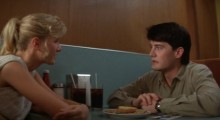
Second #3901, 65:01 1. Jeffrey: “I’m seeing something that was always hidden.” 2. J. G. Ballard, from Concrete Island, 1974: When he reached the embankment and searched for the message he had scrawled on the white flank of the caisson, he found that all the letters had been obliterated. 3. André Breton, from “Manifesto of Surrealism,” 1924: Under the pretense of civilization an progress, we have managed to banish from the mind everything that may rightly or wrongly be termed superstition, or fancy . . . It was, apparently, by pure chance that a part of our mental world which […]
-
The Forgiveness of Blood — A Hammer to Nail Review
(The Forgiveness of Blood is being distributed by Sundance Selects and comes to theaters on February 24, 2012. It world premiered at the 2011 Berlin International Film Festival. NOTE: This review was first posted at Hammer to Nail in conjunction with its screening at the 2011 Toronto International Film Festival.) The future of American independent filmmaking may not lie in America at all. In recent years, a number of filmmakers have turned their eyes away from the complexities of 21st century American life and toward the world beyond our national borders. The decision to engage another culture through filmmaking, to […]
-
The Blue Velvet Project, #82
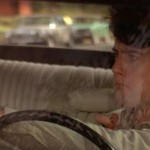
Second #3854, 64:14 “I saw The Yellow Man come out and meet up with a well-dressed man carrying an alligator briefcase,” Jeffrey tells Sandy, as we see him snapping a picture with his rigged-up camera-in-a-shoebox, a strange, analog echo of the Lumière brothers’ early motion picture camera. The sequence is reminiscent of a similar one (also involving doubles) in Brian De Palma’s Dressed to Kill, when Kate’s (Angie Dickinson’s) son Peter (Keith Gordon) has suspicions about Dr. Elliott (Michael Caine) and concocts a camera set-up to photograph the entry to his office. The whole operation is so dead-on: the detective’s […]
-
The Blue Velvet Project, #81
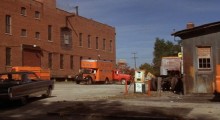
Second #3807, 63:27 1. “Today,” Jeffrey tells Sandy at Arlene’s, as we see a flashback of what he’s describing, “I staked out Frank’s place with a camera. Now, there’s another man involved in all this. I call him The Yellow Man.” These shots, in the bright of day, are some of the most quietly beautiful in the film with their burnt-orange 1940s-era Allied Vans, as if Walker Evans photographs had switched to color. 2. In Derek Raymond’s novel The Devil’s Home On Leave, the nameless Detective Sergeant recalls a terrible dream: But in the night I dreamed that two figures […]
-
Lady Vengeance: Trailer Happy, February 2012
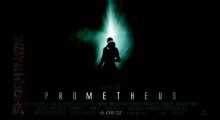
Trailers have the ability to psyche us up, freak us out, turn us off, and lead us very, very astray, but the heightened anticipation (they don’t call them teasers for nothing) is part of the fun, regardless of how accurate a representation of the film that cleverly constructed little bugger ends up being in the end. Here’s a little commentary on a selection of recent genre trailers; let’s both judge a book by its cover and appraise the cover itself. THE SNOWTOWN MURDERS (Justin Kurzel, in theaters March 2nd) I always feel wary of trailers that start off […]
